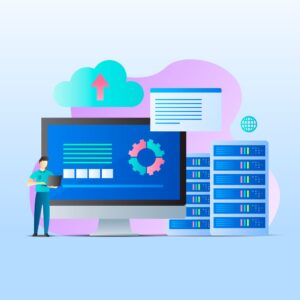In today’s digital age where cyber-attacks threaten every business and individual, safeguarding your crucial data becomes paramount. According to Getastra, approximately 2,200 cyber-attacks occur every day, which means a cyber-attack happens on average every 39 seconds. This number emphasizes the importance of investing heavily in your ERP system.
ERP security plays an integral function for small to large organizations, bringing different departments together such as finance, human resources, and supply chain management – making them a center of attraction for cybercriminals.
ERP systems store highly sensitive data, including financial records and customer information. A breach of this data could result in significant financial losses and severely damage the companys reputation. Ensuring robust ERP security is essential to protect against these risks. However, it’s crucial to take preventive and heightened security measures to protect your data.
This blog post covers ERP security best practices, highlighting the importance of adopting effective security measures and outlining the best practices to safeguard your crucial information.
Read on to know about how you can secure your ERP system.
What is an ERP Security System?
ERP security involves protecting all crucial information and sensitive data within your Enterprise Resource Planning system from malware, data breaches, cyber threats, unauthorized access, and attacks. It encompasses everything from providing firewalls for your system infrastructure to safeguarding your business data.
Furthermore, ERP systems offer robust security measures to protect a company’s assets and systems, including infrastructure, network, operating system, and database security. This includes secure server configurations, enabling security logging, securing in-system communications, and ensuring data security. ERP security thus serves as the backbone of your operations. However, to effectively mitigate risks and address vulnerabilities, it is essential to understand the challenges associated with ERP systems.
Common vulnerabilities and threats
Vulnerability and threat are weaknesses that can be impacted by malicious acts. For instance, overly permissive applications and accounts are the gateway for cybercriminals to break the security and gain a foothold within the IT environment. A threat is a malicious activity that can breach security and exploit a vulnerability.
#1. Misconfigurations
Misconfigured cloud settings account for 23% of public cloud security incidents, making them a serious security concern. Cybercriminals take advantage of these shortcomings to breach cloud systems and steal confidential information. Unrestricted outbound access, turned-off logging, exposed access keys, open databases, aches, and storage buckets are a few of the most frequent misconfigurations.
It is crucial to recognize that certain ERP security features must be properly configured to ensure maximum protection. Incorrect or incomplete configurations can create vulnerabilities, making it easier for cybercriminals to exploit your system. For example, failing to enable multi-factor authentication, improperly setting user permissions, or not configuring encryption protocols correctly can leave your ERP system exposed to attacks. Regular security assessments and audits are essential to identify and rectify any misconfigurations, thereby preventing potential breaches and ensuring the integrity of your cloud ERP security.
#2. Unsecured APIs
APIs often serve as gateways between different applications and systems, making them prime targets for attackers seeking to exploit any gaps in security. Implementing strong authentication and authorization measures, regularly updating and patching APIs, and monitoring API traffic for unusual activities are critical steps in mitigating these risks. Furthermore, incorporating API security into your overall ERP cyber security strategy ensures that your entire system remains resilient against potential threats. Continuous education and training for IT teams on emerging API threats and security protocols are essential to maintaining robust protection in a cloud ERP environment.
APIs, if not properly secured, present a common vulnerability. Given their public IP addresses, they are susceptible to exploitation by cybercriminals. Securing APIs is particularly challenging due to the potential for human error, making it crucial to educate IT teams on specific security practices tailored to cloud environments.
#3. Outdated or unpatched software
Staying current with software updates is essential for maintaining strong ERP security. Software vendors frequently release patches and enhancements designed to fix security vulnerabilities and improve functionality. Running outdated software can leave your system vulnerable to cyberattacks, making it an easy target for hackers. It’s easy for updates to be overlooked, which can expose your organization to serious threats such as malware or ransomware.
NetSuite ERP security helps organizations create a procedure for automating and prioritizing software upgrades and patching to reduce this risk and maintain the security of their systems and endpoints.
#4. Zero-day vulnerabilities
The software vendor and company are sometimes unaware of the zero-day vulnerability, a security shortcoming that a threat actor has found. The phrase “zero-day” refers to the fact that the software manufacturer had “0” days to work on a security patch or update to address the issue, during which time the attacker was aware of the vulnerability in the product. Because zero-day attacks may be very hard to detect, they pose a serious risk to businesses. A comprehensive reaction strategy with ERP cyber security in the event of a cyberattack and preventive technologies are essential to defend successfully and identify and neutralize zero-day assaults. Businesses may get ready for these sneaky and destructive occurrences by implementing a full endpoint security measure.
#5. Weak or stolen user credentials
Reusing passwords can increase system vulnerability, thus it’s crucial to create unique and strong passwords for every account, reducing the danger of cyberattacks. Cybercriminals frequently utilize brute force attacks to take benefit of vulnerable credentials, attempting different login and password combinations in an attempt to obtain illegal access.
To strengthen cloud ERP security, organizations should enforce policies that require strong, unique passwords and regular updates. Multi-factor authentication (MFA) is also essential for adding an extra layer of security. NetSuite, for instance, supports robust password policies and MFA, helping to minimize the risk of unauthorized access. NetSuites security features allow administrators to enforce password complexity rules, set expiration periods, and require users to update passwords regularly. Additionally, by enabling MFA, NetSuite ensures that even if a password is compromised, unauthorized access is significantly harder to achieve. Promoting better security practices through user education on the importance of strong passwords and the risks of weak credentials further enhances overall ERP security.
#6. Access control or unauthorized access
Granting employees greater access than necessary raises the possibility of identity-based attacks and expands the scope of potential entry points for attackers during data breaches. These dangers may be reduced by putting the principle of least privilege (POLP) into practice, ensuring people have only the rights necessary for their job tasks. POLP is a very good technique for improving an organization’s cybersecurity posture since it strengthens overall ERP cyber security by offering greater control and monitoring over network and data access.
NetSuite facilitates the implementation of POLP by offering robust role-based access control (RBAC) features. Administrators can define specific roles with precise permissions, limiting access to only the data and functions required for each user’s responsibilities. This granular level of control helps prevent unauthorized access and reduces the risk of internal threats. Additionally, NetSuites auditing tools allow organizations to track and monitor user activities, ensuring compliance with security policies and providing insights into potential security gaps. By leveraging NetSuites capabilities, organizations can effectively enforce POLP and enhance their overall ERP cyber security strategy.
#7. Misunderstanding the Shared Responsibility Model (i.e., Runtime Threats)
Cloud networks adhere to the “shared responsibility model,” in which the business manages the data, applications, and operating system, while the provider safeguards the infrastructure. However, this could result in misinterpretations and lead consumers to believe they have complete protection from the cloud provider.
To address this, organizations must enhance their cybersecurity strategies specifically for cloud environments. This involves not only relying on the security measures provided by the cloud provider but also integrating additional, traditional security practices such as regular data encryption, endpoint security, and comprehensive monitoring. By proactively managing both cloud-specific and traditional security protocols, businesses can ensure a more robust defense against potential threats. Leveraging the security features offered by platforms like NetSuite, including data encryption, access controls, and regular security assessments, can further fortify an organizations overall cloud ERP security posture.
Importance of Security for ERP Systems
ERP (Enterprise Resource Planning) systems hold and manage sensitive information including financial data, customer records, operational specifics, and several business operations which is why safeguarding company data is paramount. By installing strong security protocols for these systems, you can secure your business from major financial loss.
The importance of security for ERP systems is utmost for several reasons.
- Sensitive Data Protection: ERP systems manage extremely sensitive information required for decision-making and run business operations effortlessly. By protecting this data, theft, illegal access, and possible abuse are all avoided.
- Regulation Compliance: Strict regulations pertaining to privacy and data security apply to various sectors. Organizations can avoid legal outcomes and even fines by adhering to these standards with the use of proper ERP security.
- Preventing Financial Losses: Fraud, data theft, and operational interruptions can all lead to significant financial losses due to security breaches. Strong security measures are put in place to assist in reducing these threats and safeguarding the organization’s financial stability.
- Preserving Operational Continuity: The day-to-day functioning of businesses depends on ERP systems. Security lapses may result in major disruptions, lost productivity, and downtime. Sustaining uninterrupted and effective corporate processes requires effective security mechanisms.
- Protecting Intellectual Property: ERP systems frequently hold important confidential data and creative works. Maintaining competitive advantage and promoting innovation depend on these assets being protected.
- Boosting Reputation and Trust: Among partners, stakeholders, and consumers alike, a safe ERP system fosters more trust. A track record of strong data security bolsters the organization’s credibility and increases trust in its business practices.
ERP Security Best Practices
Considering ERP security solutions and integrating them with your security operations will ensure strong control to protect your ERP system. But staying abreast of the most recent enhancements and updates in cybersecurity and local issues keeps you one step ahead of the potential dangers. Heres the best practices you should take for the security assessments on your ERP systems.
#1. Strong & Safe Password Hygiene
Password hygiene and employee training play a pivotal role when practising safe and adequate safety measures. It will help to protect the internal security risk posed by inadequate security knowledge within your organization.
For example, threats, risks, or vulnerabilities can often be traced back to an internal compromise, such as phishing attacks. However, by training staff members, implementing two-step verification, or updating software and security patches more frequently, a business can simply prevent a superuser’s compromise within the ERP system.
#2. Foster a Security-Aware Workforce
An informed and security-conscious workforce is crucial to maintaining a well-protected ERP system. To effectively safeguard against hackers and unauthorized access to sensitive data, its essential that all employees are educated on ERP security best practices. This includes regular training on recognizing phishing attempts, following proper data handling procedures, and understanding the importance of secure passwords and multi-factor authentication. By keeping everyone in the loop and making security a shared responsibility, organizations can ensure that security procedures are executed with precision and diligence, reducing the risk of breaches and enhancing the overall security of the ERP system.
#3. Stay Secure from External Risks
ERP security offers robust measures and firewalls that you can leverage to secure against both internal and external risks. From detecting exploitation, data leaks, and fraud to identifying unauthorized access, ensuring data integrity, providing continuous and automated audits, and centralizing security monitoring, these enterprise resource planning solutions help you secure your ERP operations.
For instance: If every security measure is in place, then a company using advanced ERP security can easily detect unusual network activity and potential breaches. It automatically alerts the team to restrict the external and outbound suspicious actions to prevent data.
#4. Multi-factor authentication
A security technique known as multi-factor authentication (MFA) demands several kinds of verification to access an account. It considerably reduces the possibility of unwanted access by adding an additional layer of security on top of only a password. MFA significantly increases the difficulty of intrusion attempts for hackers by requiring a password, smartphone, token, biometric data, and something you know. This protects your sensitive data within the ERP system.
NetSuite, for instance, supports MFA and allows organizations to enforce it across all user accounts, ensuring that access to critical ERP data is tightly controlled. By integrating MFA into your ERP security strategy, you can greatly enhance your system’s resilience against cyber threats and ensure that only authorized users can access sensitive information. Regularly reviewing and updating your MFA settings, along with educating users on the importance of this security measure, further strengthens your overall ERP security posture.
#5. Regular data backups
For effective ERP security, it is crucial to execute a relentless and reliable backup strategy. By regularly and securely backing up your enterprise resource planning data ensures that you can swiftly recover critical information during security breaches or system failures. This involves utilizing secure storage methods such as encryption and offsite or cloud-based solutions, alongside maintaining a schedule for frequent backups.
Additionally, routinely testing your backup processes is crucial to verify their integrity and effectiveness. By adhering to a comprehensive backup policy, you can minimize downtime, maintain operational continuity, and fortify your organizations defenses against data loss and cyber threats.
How Entartes’ ERP Incorporate Security Measures to Protect Your Data
At Entartes, we provide tailored solutions to help you fully leverage the security benefits of NetSuite ERP for your business. Our process begins with a thorough assessment of your ERP environment, where we work closely with your team to identify potential bottlenecks, vulnerabilities, and security gaps. We then provide recommendations and implement solutions to optimize your ERP investment and ensure robust security.
- We provide various NetSuite ERP solutions that are customized to your company’s unique requirements.
- Our NetSuite ERP security ensures robust privacy and high-end data security of your data and critical information.
- Our professionals help you at every step, from understanding the vulnerabilities to fixing them before they hurt your company data.
- Our experts will safeguard your sensitive data by implementing advanced security and robust privacy measures.
- Our team will assist at every stage of the security process, address vulnerabilities and preempt threats before they pose risks.
- We ensure the security and integrity of your ERP system by enhancing the overall data security posture.
Final words,
The thriving world requires your ERP system to be more secure than before. You must invest in strong ERP security to safeguard your invaluable company data, as cyberattacks occur every 39 seconds.
By adhering to best practices such as enforcing strong password policies, implementing multi-factor authentication, and conducting regular backups, you can mitigate financial risks, avoid operational disruptions, and safeguard your companys reputation.
However, securing your ERP system goes beyond just following best practicesit requires the right expertise and tailored solutions. By partnering with a leading NetSuite ERP provider like Entartes, you can ensure your ERP system is fortified against potential threats. At Entartes, we offer customized NetSuite ERP solutions designed to meet your specific security needs. We work closely with you at every step to ensure your ERP system remains highly secure and fully aligned with your business goals.
Strengthen your safety measures to secure your ERP system.





